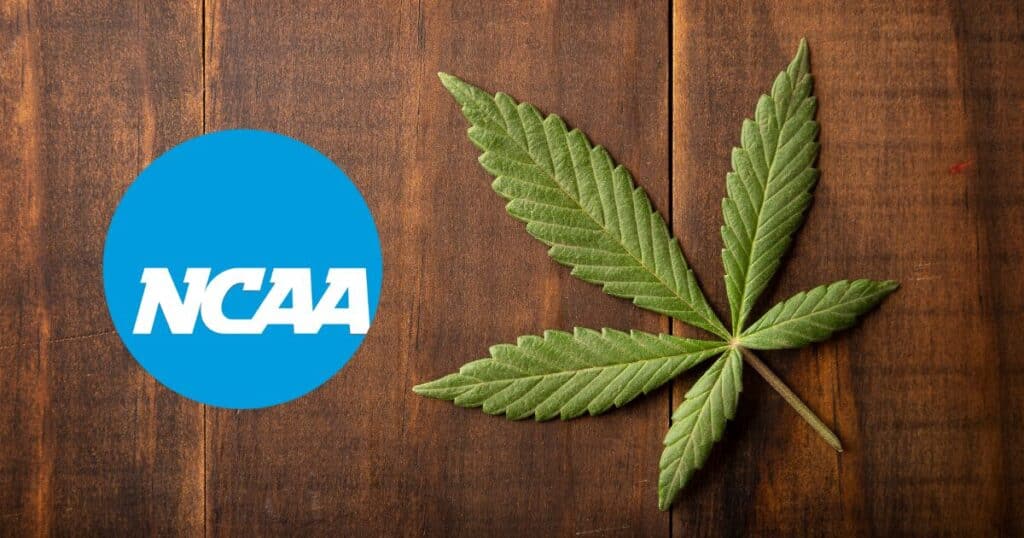The National Collegiate Athletic Association (NCAA) Committee on Competitive Safeguards and Medical Aspects of Sports has formally recommended the removal of cannabinoids, from its list of banned substances for college athletes. This recommendation comes after extensive research and input from industry experts and members of the NCAA.
This topic is highly significant as it addresses a long-standing issue in sports and acknowledges the shifting cultural and legal landscape surrounding marijuana. The NCAA’s decision to potentially remove cannabinoids from its list of banned substances has long been overdue, as marijuana is not a performance-enhancing drug and current policies are deemed ineffective.
This move also reflects a larger trend seen in other professional sports leagues, such as the MLB and NBA, where they have either removed marijuana from their list of banned substances or stopped testing for it altogether. The NCAA’s potential decision could have a significant impact on the lives and well-being of student-athletes, making it an important topic to discuss and educate others about.
NCAA Policies On Cannabis
Marijuana has been a controversial topic in the world of sports for many years. Its use among athletes has raised concerns about fair play and the potential harm it may cause to their health.
In 1986, the NCAA first added marijuana to its list of banned substances and began testing for it in drug screenings. This move was largely due to the growing stigma around marijuana at the time and its classification as a Schedule I drug by the federal government. However, over the years, there has been a growing body of research that suggests marijuana is not a performance-enhancing drug.
Despite this, current NCAA policies still list cannabis and its constituents as banned substances. This means that student-athletes can face penalties such as suspension or loss of eligibility if they test positive for marijuana. However, last year, the NCAA and CSMAS did make a small change to its policy by increasing the threshold for a positive test from 35 to 150 nanograms per milliliter, aligning it with WADA’s standards.
The ongoing debate around marijuana use in sports and its medicinal benefits has led to the NCAA’s current recommendation for change. By understanding the history and current policies surrounding marijuana in college athletics, we can better appreciate the significance of this potential policy shift by the NCAA. So, it is a long overdue step towards modernizing their approach and prioritizing student-athlete health and well-being.
Reasons Behind The CSMAS Recommendation
The NCAA‘s potential decision to remove cannabinoids from its list of banned substances is based on a recommendation by the Committee on Competitive Safeguards and Medical Aspects of Sports (CSMAS). This recommendation came after extensive discussions and research, including the Summit on Cannabinoids in College Athletics, held in December 2022.
The NCAA Committee on Competitive Safeguards and Medical Aspects of Sports recommended that each of the three divisional governance bodies introduce and adopt legislation that would remove cannabinoids from the list of NCAA banned drug classes.https://t.co/j5Y5TvEGvM
— NCAA PR (@NCAA_PR) September 22, 2023
The CSMAS came to three conclusions, which serve as the reasons behind their recommendation.
- Acknowledges the ineffectiveness of existing policy (banning, testing and penalizing).
- Affirms the role of the NCAA drug-testing program to address only performance-enhancing substances.
- Emphasizes the importance of moving toward a harm-reduction strategy that prioritizes education and support at the school level over penalties.
This recommendation is a step towards modernizing the NCAA’s approach and prioritizing student-athlete health and well-being. By acknowledging cannabis as not a performance-enhancing drug and treating cannabis with harm-reduction strategies instead of being penalized, much like the NCAA approaches alcohol.
Potential Impact on Student-Athletes
The potential removal of cannabinoids from the list of banned substances by the NCAA would have a significant impact on student-athletes and the world of college sports as a whole. Most importantly, it would reduce the stigma surrounding marijuana use among athletes.
At present, student-athletes who use marijuana are often seen as breaking rules and risking their athletic career. This can lead to shame and secrecy around its use, which can have negative impacts on mental health. By removing this substance from the list of banned substances, the NCAA would be acknowledging that marijuana is not a performance-enhancing drug and should not be treated as such. This could improve the mental well-being of student-athletes who may use marijuana for medicinal purposes or recreational use.
Moreover, by implementing harm reduction strategies instead of penalties, student-athletes can receive proper education and support if they choose to use marijuana. This can result in improved overall physical well-being and reduce the potential harm that may come from its use.
Lastly, removing cannabinoids from the list of banned substances would also increase fairness in competition. With more lenient policies towards marijuana, student-athletes who may have been unfairly penalized in the past can now compete without fear of losing eligibility due to testing positive for marijuana.
Overall, the NCAA’s recommendation to remove cannabinoids from its list of banned substances is a welcome change that is long overdue. By recognizing marijuana as not a performance-enhancing drug and implementing harm reduction strategies instead of penalties, the potential impact on student-athletes is immense. It can lead to reduced stigma, improved mental and physical well-being, and increased fairness in competition.
This policy shift also reflects the evolving cultural and legal landscape surrounding marijuana. The recommendation by the CSMAS is a step towards modernizing their approach and prioritizing the health and well-being of student-athletes, and it can ultimately benefit both the individual athlete and school athletic programs as a whole. So, it is time for the NCAA to make this change and lead the way in promoting a safer and more informed environment for college athletes. So, let’s keep our fingers crossed for the NCAA to take this progressive step forward.
Keep updated on all the latest news and updates in the Cannabis industry here at Beard Bros Pharms by signing up for our Friday Sesh Newsletter here. Always Dank and Never Spam!















